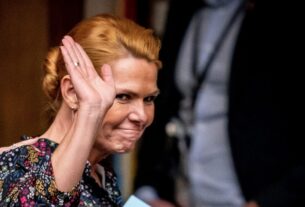Ukraine will fund the bulk of its post-war recovery with wealth that Western powers are confiscating from Russia’s oligarchs, according to its prime minister. But for some of Kyiv’s allies — such as Switzerland — that’s easier said than done.
“The right of ownership, the right of property is a fundamental right,” Switzerland’s president, Ignazio Cassis, said during a press conference Tuesday alongside Prime Minister Denys Shmyhal after two days of high-level talks about Ukraine’s reconstruction in the Swiss city of Lugano. “Of course, we can violate fundamental law. But we have to create the legal base.”
Cassis’ comments reflect a wider reluctance among some major economies to seize and sell the assets of Russian oligarchs without delay to rebuild a war-torn Ukraine once Moscow ends its invasion. Moreover, the EU has had a checkered past of enforcing and defending its financial penalties against business executives, world leaders and corporations in court.
Similar challenges face Switzerland, where Russian clients hold up to $214 billion in assets in Switzerland. It’s facing criticism for its slow crackdown on oligarchs despite implementing European sanctions.
Against these tempered expectations, Shmyhal made a pitch at Lugano’s “Ukraine recovery conference,” outlining a three-stage recovery plan that he said involves thousands of projects to modernize the country and put it on the path to joining the EU.
The European Commission also used the event to unveil a platform for development banks, international institutions and countries to oversee and help develop projects to reconstruct the country.
But pledges and goodwill may not amount to much given the wreckage from Moscow’s invasion of Ukraine. The war has hit Ukraine’s finances hard, leaving the government with some $750 billion in economic losses to contend with. And Ukraine has been dealing with further setbacks, like Russian forces’ capture last weekend of a major city in the Luhansk region, Lysychansk.
Allied governments and international financial institutions have tried to alleviate some of the financial pain by providing Kyiv with $8 billion in grants and IOUs since Russia’s invasion in late February. But that has made little difference to the government’s growing budget deficit, which has now reached $5 billion a month.
The EU, for its part, pledged in May to loan the country up to €9 billion, although negotiations are still making their way through Brussels.
The cash crunch has concentrated Ukrainian officials’ gaze on Russia’s sanctioned oligarchs. The government has been working the diplomatic channels since the beginning of June to build political momentum for an accord to make the Russians pay, Deputy Minister of Justice Iryna Mudra Tuesday said in an interview from Kyiv.
“Of course, we are very thankful to our allies for stepping up with financial help,” she said. “But we do have to admit that it should the Russians who should pay for all these damages.”
However, there’s no ready-made legal structure that would allow for seizing frozen Russian assets and sending them to Ukraine, she said, especially since Russia could veto anything at the U.N. level from its perch on the Security Council.
So instead, the Ukrainian government is aiming to get at the very least the global community’s “blessing” at the U.N. General Assembly in September, Mudra said. In addition to Russian assets, Kyiv would also like to see a special tax on transactions with Russia.
Sending a signal
Ukraine’s Western allies have frozen between $300 billion and $500 billion of oligarchs’ assets, according to Shmyhal. Those riches would be indispensable to the post-war recovery, which the prime minister hopes can begin within the coming years.
But the lack of uniform rules for seizing frozen assets makes this goal difficult. The Commission in late May pushed to address the problem by proposing rules that would make sanctions evasion an EU crime. That would give countries the legal basis they need to confiscate the assets in question.
On the international stage, Canada last week passed legislation to seize and sell assets of individuals and entities on its sanction list. The U.K. is reportedly eyeing similar measures.
It’s important for Ukraine’s allies to speed up the bureaucratic process, Shmyhal said. Not just so that Kyiv can begin laying the foundation for its recovery plan, but because targeting oligarchs’ riches would send a clear message to warmongering states across the world.
“It’s very important for [the] civilized world to give a signal to [the] Russian aggressor and to other potential aggressors in the future, to understand that unprovoked aggression should be paid by this aggressor,” Shmyhal said. He called for international action to develop legislation that allows for the “confiscation of frozen assets in case of unprovoked aggression.”
Cassis was sympathetic to Shmyhal’s calls. He urged patience, however, as governments develop rules that can seize oligarchs’ assets without paving the way for future governments to abuse individual rights.
“There have been many, many, many wars during the century in order for the population to have freedom and human rights,” said the Swiss president. “You have to ensure the citizens that he is protected against the [power] of the state. This is what we call liberal democracies.”



